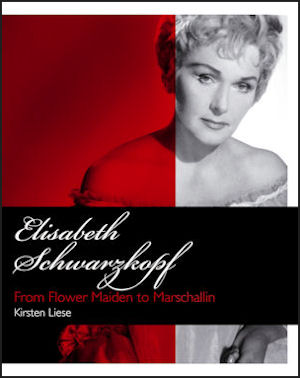 Elizabeth Schwarzkopf:
Elizabeth Schwarzkopf:
From Flower Maiden to Marschallin
by Kirsten Liese
Amadeus Press
160 pages, photos; $27.95 US
During her recent recital in Koerner Hall last month, Frederica von Stade spoke about hearing Elizabeth Schwarzkopf sing over forty years ago, and what an impression it left on her. That made me think about the recital I heard Schwarzkopf give at Massey Hall in the early 1970’s. I can still picture her opening her arms like a butterfly spreading its wings – magnificent and unforgettable.
This large, lovely collection of interviews, testimonials and splensis photographs is not so much a biography as a tribute to the great singer. The only hint of controversy is when Schwarzkopf talks about how Karajan pressured her to take on roles that were too heavy for her, like Elizabeth in Tannhäuser. There is no discussion of her activities during the war, or her documented associations with the Nazi party. Instead the focus is on what her former student, American baritone Thomas Hampson, here calls ‘her passion, her sense of beauty and her singular sense of artistic purpose’ .
In Charles Scribner III’s moving interview with Schwarzkopf shortly before her death at ninety three years ago, she talks about her contempt for contemporary concept-driven productions and her intense dislike of updating the settings of operas. The word “criminals” comes up. Schwarzkopf realizes that she represents a vital tradition of singing, especially for the Viennese repertoire like Strauss and Mozart. “The fixed style of Mozartean singing has rules,” she tells Scribner.
Author and editor Kirsten Liese interviews Lillian Fayer, the photographer who took most of the stage and portrait photos included here. In these photos Fayer penetrates the artificiality of the costumes and makeup to reveal the extraordinary naturalness of the singer. So I was amused when Fayer tells Liese that she was always trying - unsuccessfully - to get Schwarzkopf to wear more makeup.
There are glamorous shots of her as Donna Elvira in Don Giovanni, which Schwarzkopf calls her most difficult role, and in her favorite role as the Marschallin in Rosenkavalier. In a few of the candid shots, we see her with her frequent accompanist, the legendary Canadian pianist Gerald Moore (author of a wonderful autobiography Am I Too Loud?). He is quoted here as saying, “Elizabeth hears things that nobody else can. She would hear the grass growing!”



